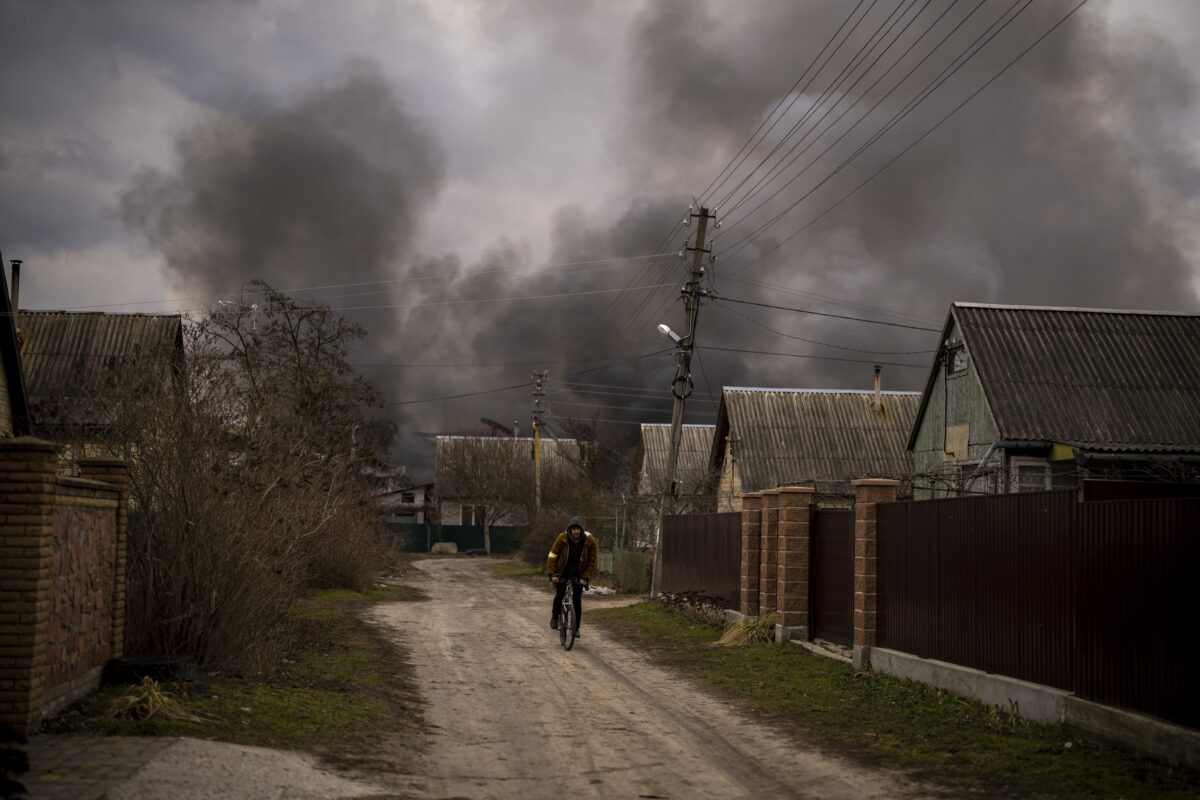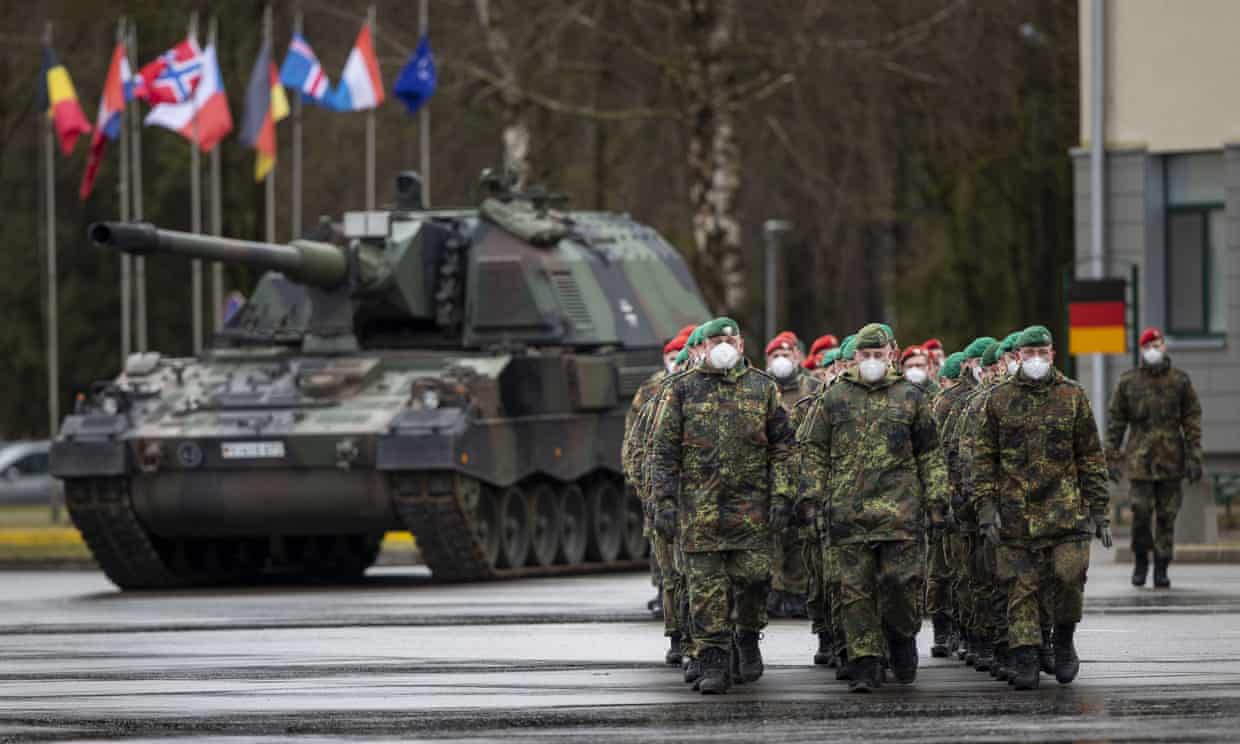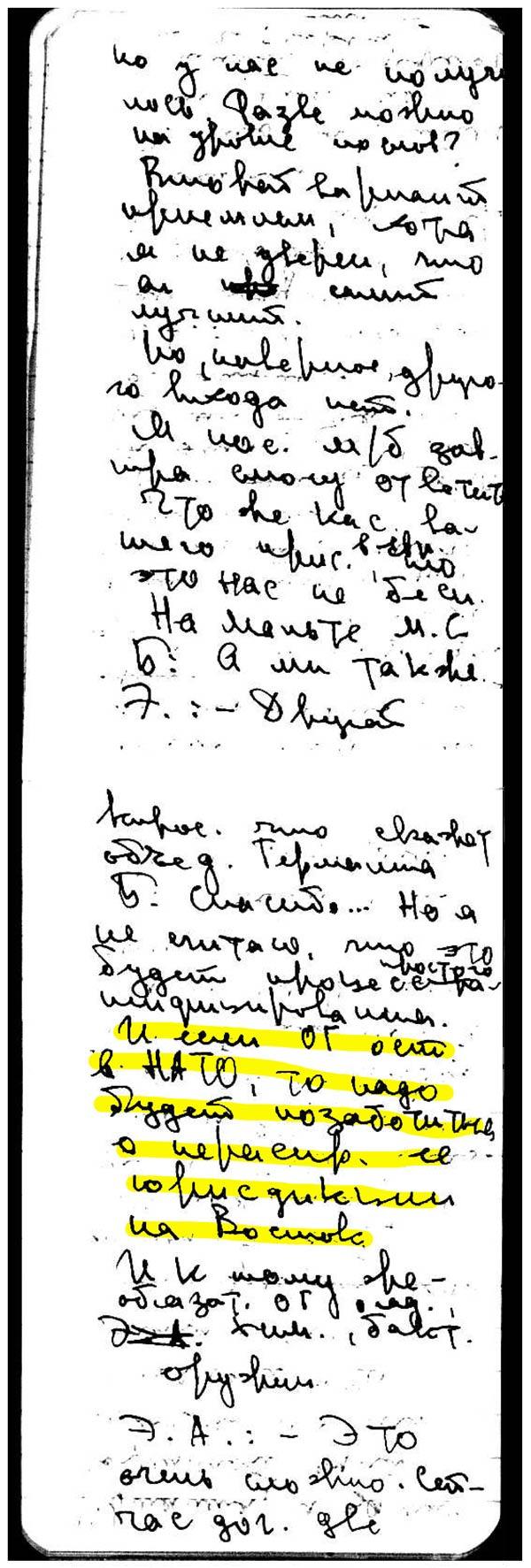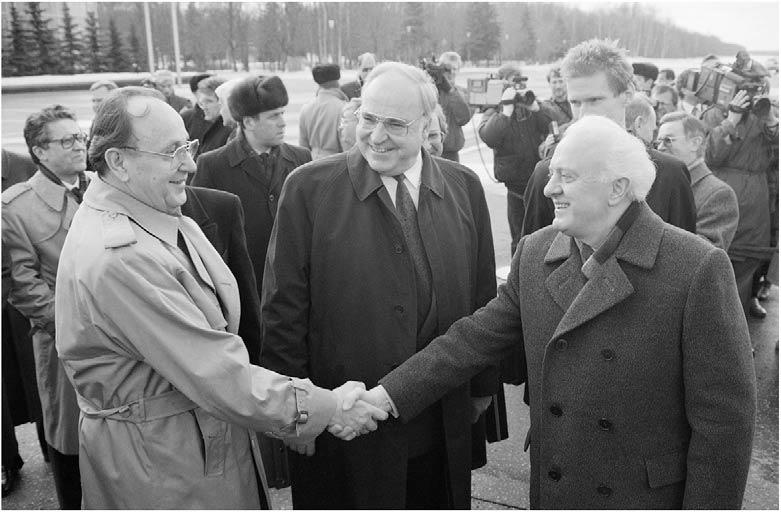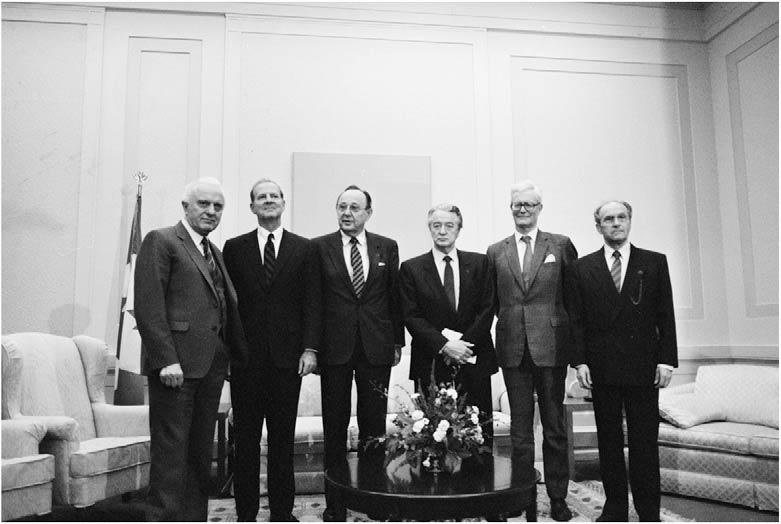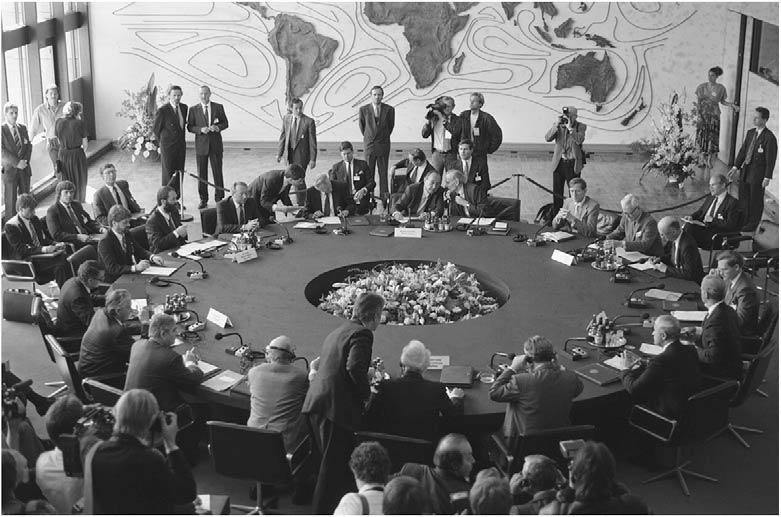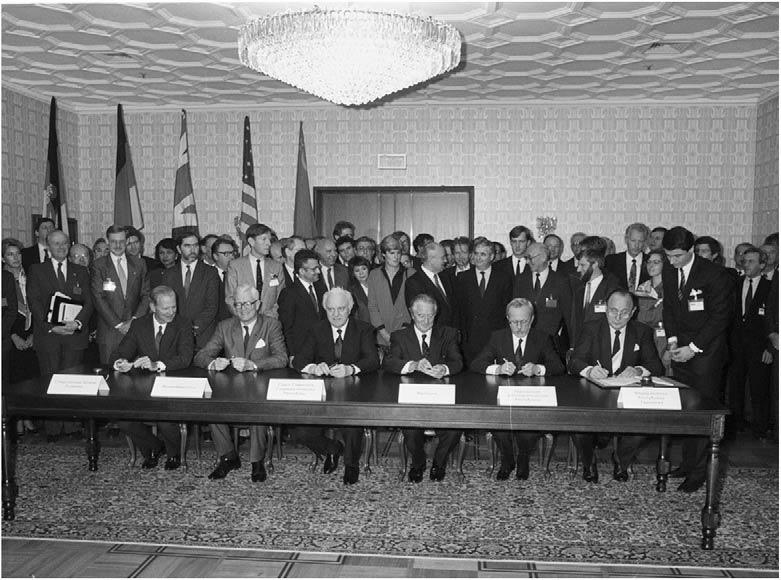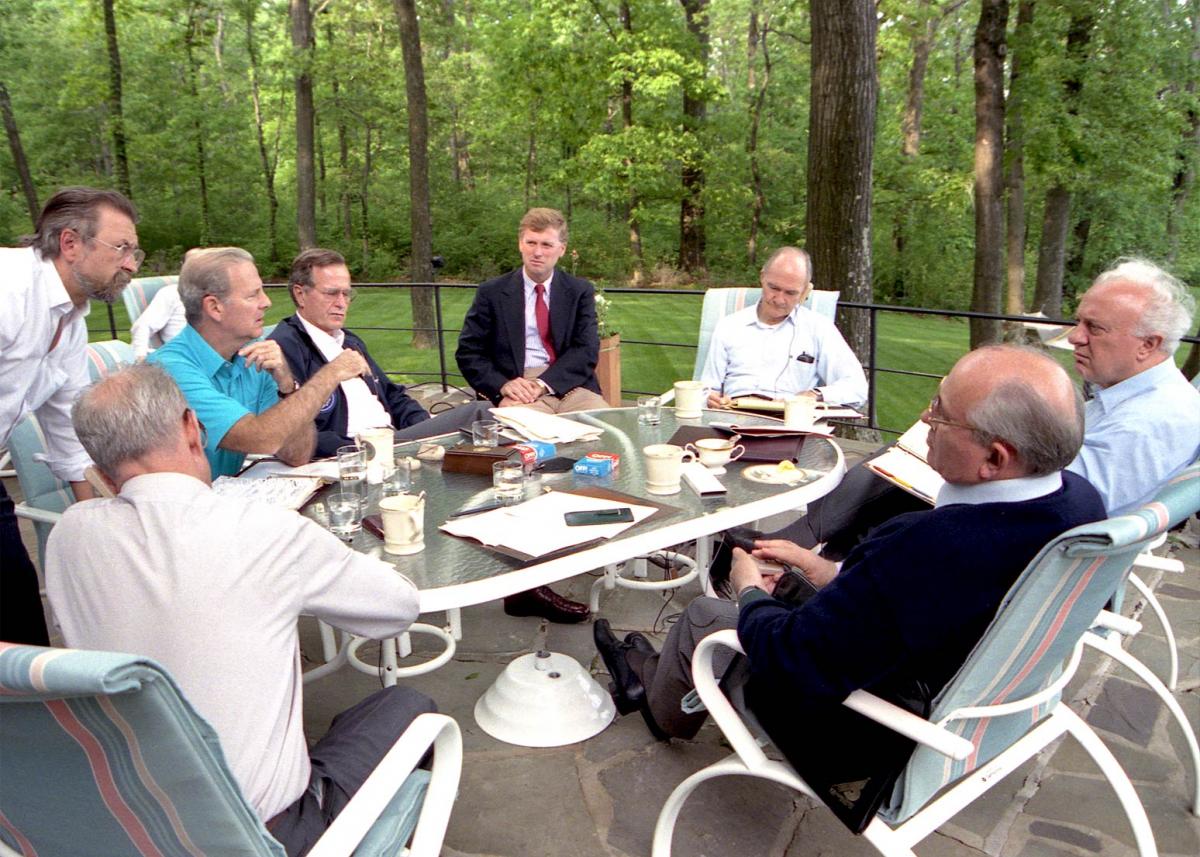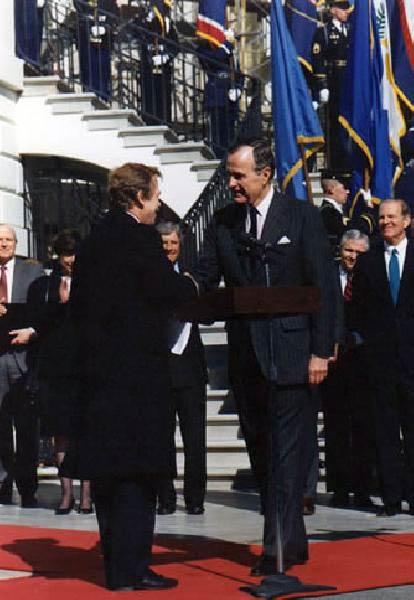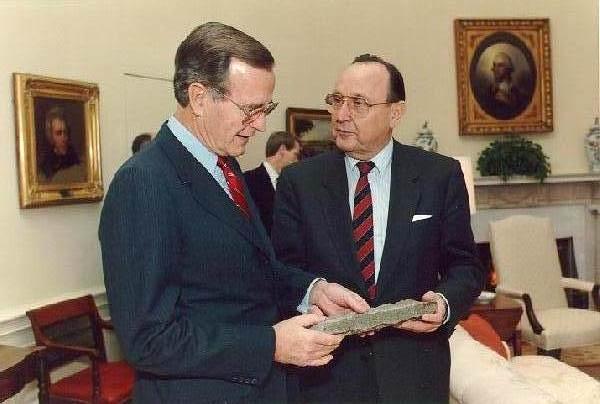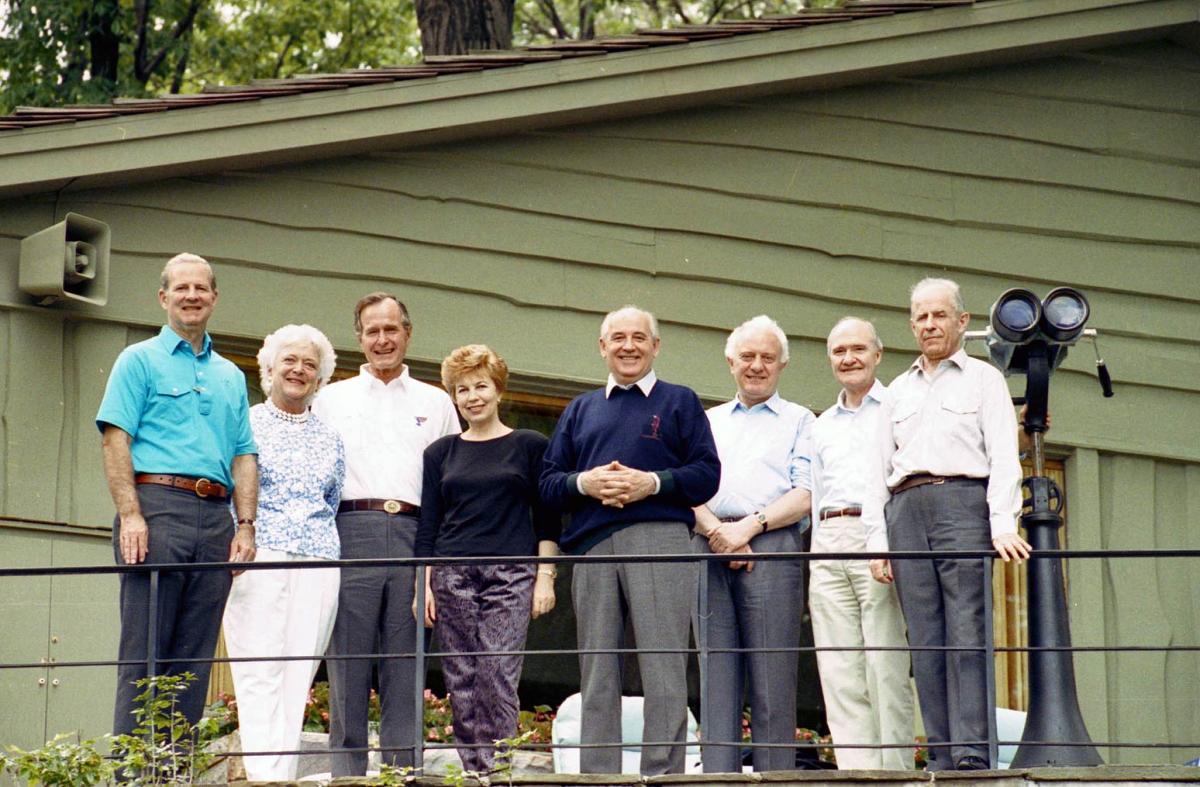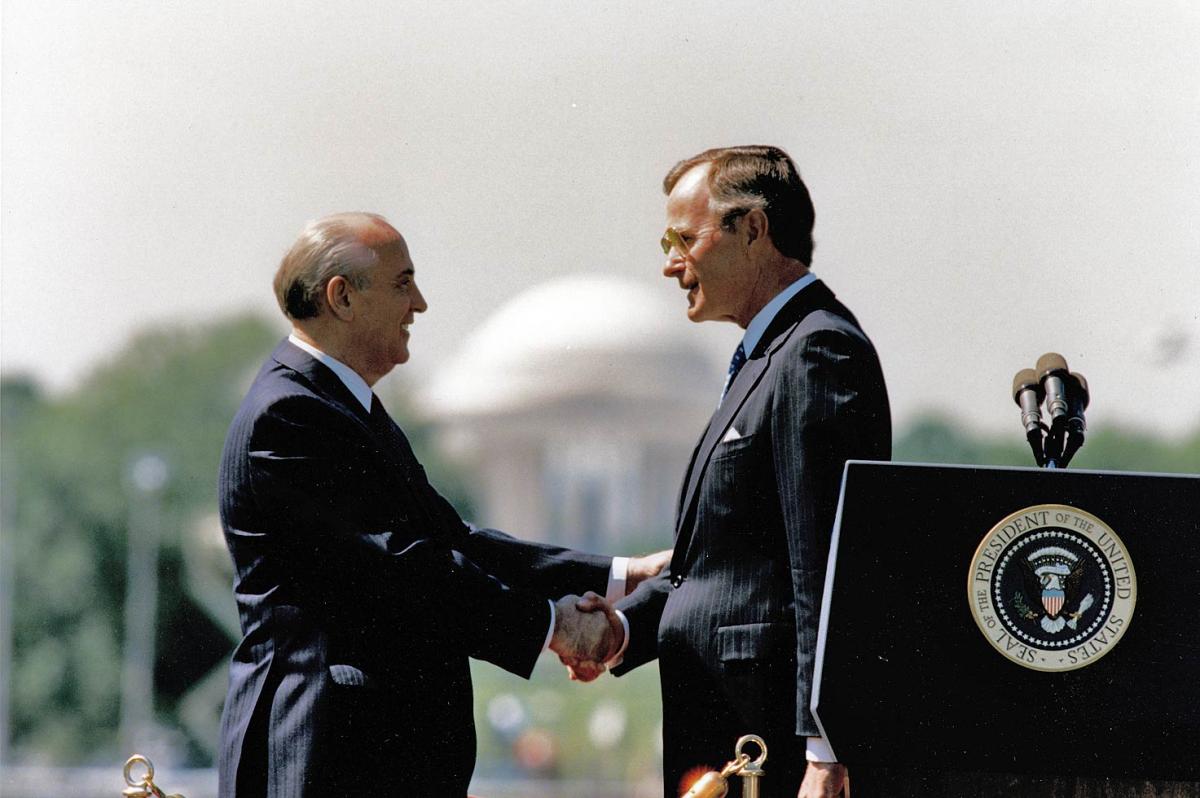The Land Where History Died, Part 1
David Stockman • February 24, 2022
Link:
https://www.unz.com/article/the-land-where-history-died-part-1/
In light of the grotesquely one-sided Ukrainian war news on the MSM, it can be well and truly said that America circa February 2022 has become the land where history died.
From the sophomoric coverage of CNN and NBC, for instance, you would think that Ukraine’s borders have been universally agreed upon by one and all for eons; that the government in Kiev has done absolutely nothing to provoke Russian suspicion and anger; and that Uncle Sam, NATO and the European Union have flitted around the neighborhoods on Russia’s borders merely cheer-leading for democracy and selflessly passing out economic aid and cookies to the long-suffering Ukrainian peoples.
Well, no. Today’s hot war eruption in Ukraine would absolutely not be happening save for the violent coup of February 2014 that overthrew Ukraine’s democratically elected pro-Russian President; and which coup was funded, organized and choreographed by Washington-based neocons, busy-bodies and arms merchants who otherwise had no reason for even existing in the post-Soviet world.
Moreover, by reviewing the voting patterns of the 2010 Ukrainian presidential election we can see exactly how Washington’s blunderbuss intervention in support of the Maidan putsch put the kibosh on stable governance in Kiev and friendly relations with Ukraine’s historic neighbor and suzerain, Russia. That’s because while the 2010 election reflectedthe stark divisions of the Ukrainian electorate (see map below) it still produced a government that was reasonably acceptable to most of the electorate, and one which proceeded to work toward new arrangements with both Ukraine’s EU neighbors to the west and Russia to the east.
In the end, that tolerable governing balance was abruptly and unilaterally cancelled by Washington’s writ, especially when it then almost instantly embraced and recognized an ad hoc, anti-Russian government which came from the extreme right side of the political/ethnic spectrum.
The effect was to send Kiev on a path toward massive economic and military aid from the US/EU and NATO membership that was bound to produce the adverse Russian reaction that Ambassador George Kennan had warned about two decades earlier.
As to the aid matter, Ukraine received only minor assistance from the west prior to 2014, but upwards of \$15 billion since then. That included nearly \$3 billion of military aid from the US, \$6 billion of development and economic aid from Western donors, \$3 billion of subsidized Ex-Im Bank funding from the US and \$3 billion of other humanitarian aid. The effect was to turn Ukraine into a ward of Washington—a new post-coup fact on the ground that was blatantly obvious to Moscow.
As to the adverse shock effect of the Maidan coup on Ukrainian governance and external policy, the map below tells you all you need to know. The dark blue parts of the map to the far east (Donbas) indicate an 80% or better vote for Viktor Janukovych in the 2010 election. By contrast, the dark red areas in the west voted 80% or more for the Ukrainian nationalist, Yulie Tymoshenko. That is to say, the skew in the Ukrainian electorate was so extreme as to make America’s current red state/blue state divide seem hardly noteworthy by comparison.
As it happened, the sum of the pro-Janukovych skews from the east and south (Donbas and Crimea) added up to 12.48 million votes and 48.95% of the total, while the sum of the extreme red skews in the center and west (the old eastern Galicia) amounted to 11.59 million votes and 45.47% of the total.
Stated differently, it is hard to imagine an electorate more sharply divided on a regional/ethnic/language basis, but one which still produced a decisive enough victory margin (3.6 percentage points) for Janukovych—so as to be accepted by all parties. That became especially clear when Tymoshenko, who was the incumbent prime minister, withdrew her election challenge a few weeks after the run-off in February 2010. At that point, of course, Russia had no beef with the Kiev government at all because essentially Janukovych’s “Regions Party” was based on the pro-Russian parts (blue areas) of the Ukrainian electorate.
During the next several years the economic basket case which was Ukraine attempted to improve its circumstances by running a bake-off of sorts between the European Union and Russia with respect to aid and trade deals.
And well its leaders might have: Ukraine had become a cesspool of financial corruption in which a handful of oligarchs had robbed the country blind. Its 2013 real GDP consequently fell to
\$600 billion (2017 \$)—a 33% shrinkage from its 1990 level.
Accordingly, the supposedly pro-Russian Janukovych administration initiated in March 2012 an Association Agreement with the European Union that was to provide trade advantages and an IMF aid package. However, the EU leaders insisted that no agreement could be ratified unless Ukraine addressed concerns over a “stark deterioration of democracy and the rule of law”, including the imprisonment of Yulia Tymoshenko in 2011. In order to address these concerns, in fact, President Janukovych urged the parliament to adopt laws so that Ukraine would meet the EU’s criteria.
Ukraine Real GDP, 1990-2019
But it was the parallel \$4 billion IMF loan that turned out to be the straw that broke the camel’s back. According to then Prime Minister Mykola Azarov “the extremely harsh conditions” of the IMF loan (presented by the IMF in November 2013) included big budget cuts and a 40% increase in natural gas bills. Those proved to be hills too high to climb for all the factions within the fractionated Ukraine polity.
Accordingly, the IMF demands became the clinching argument behind the Ukrainian government’s decision to suspend preparations for signing the Association Agreement with the EU. Instead, Kiev quickly pivoted to a deal with Russia in the fall of 2013, which was willing to offer \$15 billion in loans without the harsh IMF pre-conditions. Also, Moscow offered Ukraine a discount on Ukraine’s large gas purchases from Russia.
Moreover, by that point Ukraine was over a financial barrel, facing an external funding gap of \$17 billion during the upcoming year—almost the level of the central bank’s depleted currency reserves.
The rest is history, as they say. The Washington neocons were not about to accept a pivot to Russia come hell or high water. So they swung into action bringing all the instruments of the Empire—the CIA, the State Department, NED, the NGOs and favored Ukrainian oligarchs—to bear on scuttling the Russian deal and removing Janukovych from office.
In a later interview with a US journalist, in fact, Ukrainian billionaire oligarch and opposition leader, Petro Porochenko (who later became president), said quite clearly that the plan was to subvert the nation’s constitution and install an unelected, antiRussian government that would deep-six the deal with Moscow:
“From the beginning, I was one of the organizers of the Maidan. My television channel—Channel 5—played a tremendously important role. …On the 11th of December, when we had U.S. Assistant Secretary of State Victoria Nuland and E.U. diplomat Catherine Ashton in Kyiv, during the night they started to storm the Maidan.”
It should never be forgotten, therefore, that the coup which overthrew the constitutionally elected government in Kiev was a \$5 billion all-hands Washington undertaking. It would never have come to fruition as a successful regime change putsch without the heavy hands of the US State Department along with the above mentioned arms of the empire.
Needless to say, nullification of a country’s election—-backed by the stick of NATO’s military might and the carrot of billions from a Washington/EU/IMF consortium—-is big league meddling, but not by the clueless hypocrisy of the Washington foreign policy blob.
Indeed, as former president Obama told CNN at the time, Washington was just going about its “indispensable nation” business. It had helpfully encouraged another “flowering of democracy” and to that end had,
“……brokered a deal to transition power in Ukraine.”
Brokered a deal my eye!
This was a blatant and inexcusable breach of so-called “international law” because it served the will-to-power objectives of the Washington neocons and kept the now largely obsolete US foreign policy apparatus in the game—-to say nothing of a new customer for arms sales.
Never mind that Washington’s massive political and financial support for the Maidan uprising on the streets of Kiev, and then nearly instantaneous recognition of the resulting putsch as the official government of the Ukraine was a frontal assault on the nation’s sovereignty.
The late and despicable Senator John McCain even went to Kiev to show solidarity with the Euromaidan activists. McCain dined with opposition leaders, including members of the ultra right‐wing Svoboda Party and later appeared on stage in Maidan Square during a mass rally
There he stood shoulder to shoulder with Svoboda leader
Oleh Tyahnybok, who made no secret of his pro-Nazi convictions.
But McCain’s actions were a model of diplomatic restraint compared to the conduct of Victoria Nuland, the assistant secretary of state for European and Eurasian Affairs, who, by your way, is back in the same position in the Biden Administration, conducting the same pro-war neocon policies.
As Ukraine’s political crisis deepened, Nuland and her subordinates became more brazen in favoring the anti‐Yanukovych demonstrators. Nuland noted in a speech to the U.S.-Ukraine Foundation in December 2013, that she had traveled to Ukraine three times in the weeks following the start of the demonstrations. Visiting the Maidan on December 5, she famously handed out cookies to demonstrators and expressed support for their cause.
Washington’s conduct not only constituted meddling, it bordered on pupeteering. At one point, US Ambassador Pyatt mentioned the complex dynamic among the
three principal opposition leaders, Arseniy Yatsenyuk, Oleh Tyahnybok, and Vitali Klitschko
Both Pyatt and Nuland wanted to keep Tyahnybok and Klitschko out of an interim government. In the former case, they worried about his extremist ties; in the latter, they appeared to want him to wait and make a bid for office on a longer‐term basis.
Nuland thus famously stated that “I don’t think Klitsch should go into the government. I don’t think it’s necessary.” She added that what Yatseniuk needed “is Klitsch and Tyanhybok on the outside.”
The two diplomats also were prepared to escalate the already extensive U.S. involvement in Ukraine’s political turbulence by bringing in the Big Guy.
Pyatt stated bluntly that,
“we want to try to get somebody with an international personality to come out here and help to midwife this thing [the political transition].”
Nuland clearly had Vice President Joe Biden in mind for that role. Noting that the vice president’s national security adviser was in direct contact with her, Nuland related that she told him,
“probably tomorrow for an atta‐boy and to get the details to stick. So Biden’s willing.”
That is to say, Victoria Nuland didn’t merely tell some undercover operatives to buy ads on Ukrainian social media, as Russia was accused of doing during the 2016 US election. To the contrary, she actually picked Yanokovych’s successor and the entire cabinet!
And we know this from a hacked phone call between Nuland and the US ambassador in Kiev. In discussing who should lead the Washington-installed government, Nuland made clear who the next prime minister would be and who he should be talking to for advice.
Nuland: I think Yats (Arseniy Yatseniuk) is the guy who’s got the economic experience, the governing experience. … what he needs is Klitsch and Tyahnybok on the outside. He needs to be talking to them four times a week, you know.
As it turned our, the putsch leaders followed Nuland’s advice to the letter, installing “Yats” as the new prime minister.
But it also filled four cabinet posts out of eleven with rabid anti-Russian crypto-Nazis.
Indeed, at the heart of the putsch were Ukrainian organizations called
Svoboda (national socialist party of Ukraine) and Right Sector. Their national hero was one Stepan Bandera—-a collaborator with Hitler who led the liquidation of thousands of Poles, Jews and other minorities as the Nazi Wehrmacht made it way through Ukraine toward Stalingrad in the early 1940s.
[FOREGOING IS JUST MORE OBVIOUS JEWWY-INSPIRED LIES BY THIS DUMB PUNK MORON WRITER, STOCKMAN--GOES TO SHOW HOW DEEPLY EMBEDDED IS THE RELIGION OF JEWWY LIES WHICH HAS CAPTURED AMERICAN CULTURE--AND NOTE STOCKMAN HERE COMPLAINS ABOUT THAT VERY FACT--THE RELIGION OF LIES WHICH HAS "CAPTURED HISTORY." ED.]
In fact, another founder and leader of Svoboda, Andriy Parubiy, was given a portfolio which included the Ministry of Defense, the Armed Forces, Law Enforcement, National Security and Intelligence. That the Kremlin was alarmed by these developments and that the Russian-speaking populations of Crimea and the Donbas (the blue areas on the electoral map above) feared an ethnic cleansing led by the new Ukrainian nationalist government in Kiev—-given the bloody WWII history we have described elswhere—is hardly surprising.
In any event, that’s what real foreign “meddling” looks like, and it is exactly what Imperial Washington does over and over again.
Indeed, the real truth of the matter is that Imperial Washington is now reaping the whirlwind it sowed over decades by massive interference in the internal politics and governance process of countries all over the world—–of which the vignette above about the Ukrainian coup is only the latest flock of chickens to come home to roost.
Contrary to the bombast, jingoism, and shrill moralizing flowing from Washington and the mainstream media, America had absolutely no national security interest—even to this day— in the spat between Putin and the coup that unconstitutionally took over Kiev in February 2014. That changed everything, and knocked the props out from under Washington’s current sanctimonious attacks on Putin for finally resorting to its own game.
Like everything reviewed above, the source of the current calamity-howling about Russia is the Warfare State. That is, the existence of vast machinery of military, diplomatic and economic maneuver that is ever on the prowl for missions and mandates and that can mobilize a massive propaganda campaign on the slightest excitement.
The post-1991 absurdity of bolstering NATO and extending it into eastern Europe, rather than liquidating it after attaining “mission accomplished”, is just another manifestation of its baleful impact, and the approximate reason why the world is now ringing with war and rumors of war.
In truth, the expansion of NATO is the underlying cause of Putin’s paranoia about his borders and neighbors, and it is surely not without merit. After all, would Russian aid to a hostile Mexican government, including para-military agents otherwise known as drug cartels, produce anything short of hysteria here?
Indeed, it needs be asked: Precisely what juvenile minds bivouacked in the Warfare State beehive actually determined that America needs a military alliance with Slovenia, Slovakia, Bulgaria, Romania, Montenegro and now the mini-state of Macedonia!
So the resounding clatter for action against Russia emanating from Washington and its house-trained media is not even a semi-rational response to the facts at hand; its just another destructive spasm of the nation’s Warfare State and its beltway machinery of diplomatic meddling, economic warfare and military intervention.
At the time the Soviet Union ended, NATO had 16 member nations bound by the Article 5 obligation of mutual defense, but when the Soviet Union and the Red Army perished, there was nothing left to defend against. NATO should have declared “mission accomplished” and dissolved itself.
Instead, it has become a political jackhammer for Empire First policies by expanding to 30 nations—many of them on Russia’s doorstep.
Subscribe to New Columns
Yet if your perception is not distorted by Washington’s self-justifying imperial beergoggles, the question is obvious. Exactly what is gained for the safety and security of the citizens of Lincoln NE or Springfield MA by obtaining the defense services of the pintsized militaries of Latvia (6,000), Croatia (14,500), Estonia (6,400), Slovenia (7,300) or Montenegro (1,950)?
Indeed, the whole post-1991 NATO expansion is so preposterous as a matter of national security that its true function as a fig-leaf for Empire First fairly screams out loud. Not one of these pint-sized nations would matter for US security, even if they decided to have a cozier relationship with Russia—voluntarily or not so voluntarily.
George H.W. Bush and his Secretary of State, James Baker, were correct back in 1989 when they promised Gorbachev that NATO’s then 16 members would not expand “by a single inch” of territory eastward in return for his acquiesce to the reunification of Germany and the effective end of the Warsaw Pact.
But rather than declare cold war victory and dismantle its NATO machinery once the 50,000 Soviet tanks on the central front were effectively melted down for scrap, virtually the opposite happened. NATO has been expanded to 30 countries including the statelet of Montenegro that has a military half the size of the police force of Philadelphia.
In the context of this relentless and pointless NATO expansion to the very borders of the shrunken Russian state, Washington not only sponsored and funded the overthrow of Ukraine’s constitutionally elected government in February 2014. But once it had unleashed a devastating civil war, it relentlessly blocked for seven years running the obvious alternative to the bloodshed that had claimed 10,000 civilian and military casualties, even before the current hot war commenced.
To wit, Ukraine could have been partitioned with autonomy for the Russian-speaking Donbas provinces—or even accession to the Russian state from which these communities had essentially originated.
After all, the artificial country of Czechoslovakia, created on a political whim at Versailles in 1919, was peacefully and inconsequentially devolved into its separate Czech and Slovakian nations a few years ago. The same is true of Yugoslavia— a polyglot federation that has now devolved into seven nations.
In that instance, the partition was partially owing to American bombers that forcibly separated Kosovo from its Serbian parent. And even then, this Washington-sanctioned partition ended up in the hands of a criminal mafia in Kosovo that makes Putin appear sainted by comparison.
But the point is, there is no threat to America in eastern Europe unless such as Montenegro, Slovenia, or Latvia were to become Putin’s invasion route to effect the Russian occupation of Germany, France, the Benelux and England.
And that’s just plain silly-ass crazy!
Yet aside from that utterly far-fetched and economically and militarily impossible scenario, there is no reason whatsoever for the US to be in a mutual defense pact with any of the new, and, for that matter, old NATO members.
And that gets us to most ridiculous NATO fig leaf of all. The patently bogus claim that Russia’s self-evidently defensive actions in Crimea and the Donbas (eastern Ukraine) back at the time of the coup in 2014 prove that it is an aggressive expansionist. But on that score, Washington’s imperial beer goggles are utterly blind to history and geopolitical logic.
As we have amplified elswhere, Sevastopol in Crimea has been the home-port of the Russian Naval Fleet under czars and commissars alike and was purchased from the Ottoman’s for good money by Catherine the Great in 1783. It is the site of one of Russia greatest patriotic events—-the defeat of the English invaders in 1854 made famous by Tennyson’s Charge of the Light Brigade—-and is 80% Russian speaking.
After 171 years as an integral part of the Russian Motherland, it only technically became part of Ukraine during a Khrushchev inspired shuffle in 1954.
The fact is, only
10% of the Crimean population is Ukrainian speaking, and it was the coup on the streets of Kiev in February 2014 by extremist anti-Russian Ukrainian nationalists and proto-fascists that caused the Russian speakers in Crimea to panic and Moscow to become alarmed about the status of its historic naval base, for which it still had a lease running to the 2040s.
In a word,
83% of eligible Crimeans turned out to vote and
97% of those approved cancelling the aforementioned 1954 edict of the Soviet Presidium and rejoining mother Russia during the March 2014 referendum. There is absolutely no evidence that the
80% of Crimeans who thus voted to sever their historically short-lived affiliation with Ukraine were threatened or coerced by Moscow.
Indeed, what they actually feared were the edicts against Russian language and culture coming out of Kiev in the aftermath of the Washington funded, supported and instantly recognized overthrow of the legally elected government. And exactly the same thing was true of the overwhelmingly Russian-speaking populations of the Donbas.
After all, the good folks of that industrial heartland of the former Soviet Union had always been an integral part of its iron, steel, chemical and munitions industries, and, indeed, their grandparents had been put there by Stalin because most native Ukrainians had not cottoned to his bloody rule.
By the same token, Uncle Joe’s 1930s Russian transplants forever hated the Ukrainian nationalist collaborators, who rampaged though their towns, farms, factories and homes in the Donbas side-by-side with Hitler’s Wehrmacht on the way to Stalingrad.
So the appalling truth of the matter is this: Owing to Washington’s blatantly foolish and reckless coup in February 2014, the grandsons and granddaughters of Stalin’s industrial army in the Donbas were to be ruled by the grandsons and granddaughters of Hitler’s collaborators in Kiev, whether they liked it or not.
But we repeat and for good reason: Without going off the deep-end, you simply can’t make up \$550 billion worth of phony reasons for an Empire First national security budget of \$750 billion that should be no more than \$200 billion under today’s circumstances. You have to invent missions, mandates and threats that are just plain stupid distortions (like the purported Russian “occupation” of Crimea) or flat out lies (like Saddam’s alleged WMDs).
Indeed, you must invent, nourish and enforce an entire universal narrative based on completely implausible and invalid propositions, such as the “Indispensable Nation” meme and the claim that global peace and stability depend overwhelmingly on Washington’s “leadership”.
Yet, is there not a more cruel joke than that?
Was the Washington inflicted carnage and genocide in Vietnam a case of “American leadership” and making the world more peaceful or stable?
Did the two wars against Iraq accomplish anything except destroy Saddam’s tenuous peace between the Sunni, Shiite and Kurds, thereby opening up the gates of hell and the bloody rampages of ISIS?
Did the billions Washington illegally channeled into the rebel and jihadist forces in Syria do anything except destroy the country, create millions of refugees and force the Assad regime to engage in tit-for-tat brutalities, as well as call-in aid from his Iranian, Russian and Hezbollah allies?
In a word, Imperial Washington’s over-arching narratives and the instances of its specific interventions alike rest on a threadbare and implausible foundation; and more often than not, they consist of arrogant fabrications and claims that are an insult to the intelligence of anyone paying even loose attention to the facts.
Then again, Imperial Washington no longer cares about facts, logic, truth and most especially history. At the time of the Bush War on Saddam’s WMD’s, Karl Rove explained the Empire’s New Creed without pulling any punches.
“That’s not the way the world really works anymore. We’re an empire now, and when we act, we create our own reality. And while you’re studying that reality—judiciously, as you will—we’ll act again, creating other new realities, which you can study too, and that’s how things will sort out. We’re history’s actors … and you, all of you, will be left to just study what we do.”
There you have it. And Rove is no out-of-the-way academic scribbler inventing some high-fluting rationalization for American global hegemony. To the contrary, he’s a lifetime Swamp creature, leading beltway racketeer and the strategic brain trust of the GOP establishment.
Needless to say, Washington continues to create its “own reality” almost weekly, and this one’s a doozy. There manifestly would be no war in the Ukraine today save for Washington’s machinations back in February 2014, but that bit of crucial history is now deader than a doornail.

